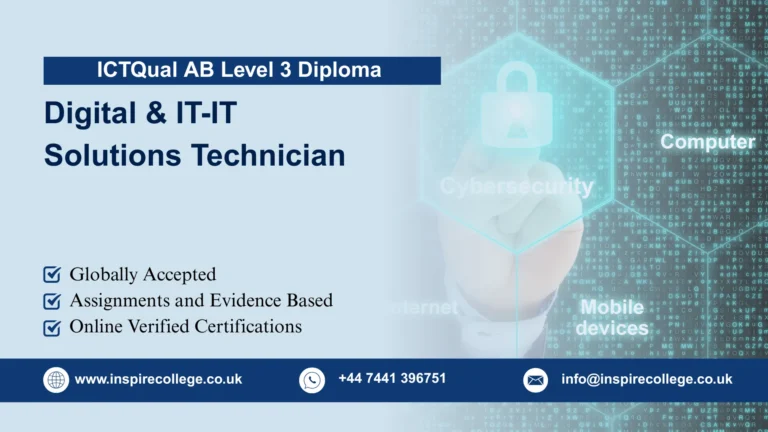
ICTQual Level 6 Diploma in Information Technology Engineering 360 Credits – Three Years
In today’s rapidly evolving digital landscape, proficiency in information technology is essential for both individuals and organizations striving for innovation and efficiency. The ICTQual Level 6 Diploma in Information Technology Engineering provides a comprehensive pathway for learners to develop advanced technical skills, analytical capabilities, and practical knowledge in IT systems, networking, software development, and engineering solutions.
ICTQual Level 6 Diploma in Information Technology Engineering is designed for both fresh graduates and working professionals seeking to enhance their IT expertise or advance their careers in technology-driven industries. The course covers a wide range of topics including computer architecture, programming, database management, cybersecurity, cloud computing, network engineering, and systems integration, ensuring that learners gain a strong foundation alongside specialized knowledge in modern IT engineering practices.
Learners will engage in hands-on projects, real-world simulations, and practical exercises, fostering problem-solving abilities, critical thinking, and innovation. By the end of ICTQual Level 6 Diploma in Information Technology Engineering, graduates will be proficient in designing, implementing, and managing complex IT systems, optimizing network infrastructures, developing secure software solutions, and applying emerging technologies to solve practical challenges across diverse industries.
ICTQual Level 6 Diploma in Information Technology Engineering not only equips learners with technical competence but also emphasizes professional development, project management, and ethical considerations in IT engineering. Graduates will be prepared for advanced roles in software development, network engineering, IT consultancy, cybersecurity, systems administration, and cloud computing, or to pursue higher education and research opportunities in information technology and related fields.
The ICTQual Level 6 Diploma in Information Technology Engineering is designed for learners who are eager to develop advanced skills in IT engineering, networking, software development, and systems management. To ensure that learners are fully prepared to benefit from this comprehensive program, the following entry requirements apply:
Age Requirements
- Applicants must be at least 18 years of age at the time of enrolment.
Educational Requirements
- A minimum of a high school diploma or equivalent.
- Preferably, prior study in Information Technology, Computer Science, Mathematics, or related STEM subjects.
Professional Experience
- Fresh candidates may enrol without prior work experience.
- Professionals with relevant experience in IT, networking, software development, or system administration will have prior learning considered for assessment purposes.
English Language Proficiency
- Applicants must demonstrate proficiency in English through academic qualifications or recognized language tests.
- This ensures learners can effectively comprehend course materials, participate in workshops, and complete assignments.
By meeting these entry requirements, learners are well-prepared to engage with advanced IT engineering concepts, practical projects, and professional applications throughout the three-year, 360-credit program, ensuring a successful learning experience and career advancement in the IT sector.
Mandatory Units
This qualification, the ICTQual Level 6 Diploma in Information Technology Engineering 360 Credits – Three Years, consists of 36 mandatory units.
Year 1: Foundation and Core Concepts
- Introduction to Information Technology
- Computer Architecture and Hardware
- Operating Systems Fundamentals
- Networking Fundamentals
- Programming Principles
- Database Design and Management
- Web Technologies and Development
- IT Support and Troubleshooting
- Mathematics for IT
- Introduction to Cybersecurity
- Systems Analysis and Design
- Project Management Fundamentals
Year 2: Specialized IT Engineering
- Advanced Networking and Protocols
- Cloud Computing and Virtualization
- Advanced Programming Techniques
- Advanced Database Systems
- Mobile Application Development
- System Security and Risk Management
- Enterprise IT Infrastructure
- Software Engineering and Development Lifecycle
- IT Management and Governance
- Business Intelligence and Data Analytics
- Human-Computer Interaction
- Ethical and Legal Issues in IT
Year 3: Professional Development and Advanced Implementation
- Advanced Networking Technologies
- Artificial Intelligence and Machine Learning
- Cybersecurity for IT Professionals
- Cloud Infrastructure and Services
- Project Management for IT Projects
- Advanced Software Development Practices
- System Integration and Implementation
- IT Research Methodologies
- Professional Practice and Ethics
- Internship/Industry Placement
- Capstone Project I: System Design and Development
- Capstone Project II: Evaluation and Implementation
The ICTQual Level 6 Diploma in Information Technology Engineering equips learners with advanced knowledge, technical skills, and practical experience in IT systems, software development, networking, and cybersecurity. Graduates will be prepared for professional IT roles, project management, and innovation in technology-driven industries
Year 1: Foundation and Core Concepts
Introduction to Information Technology
- Understand fundamental IT concepts, components, and systems.
- Demonstrate awareness of the role of IT in modern business and society.
- Apply basic IT tools and techniques for problem-solving in practical scenarios.
Computer Architecture and Hardware
- Explain the structure and function of computer components and architectures.
- Configure and troubleshoot basic hardware systems.
- Analyze performance and compatibility of hardware components.
Operating Systems Fundamentals
- Demonstrate understanding of OS concepts, functions, and services.
- Install, configure, and manage operating systems in practical tasks.
- Apply file management, process scheduling, and memory management effectively.
Networking Fundamentals
- Understand network topologies, protocols, and models.
- Configure basic network devices and troubleshoot connectivity issues.
- Apply networking concepts to small-scale practical projects.
Programming Principles
- Develop problem-solving skills using structured programming.
- Write, debug, and test basic programs in a chosen programming language.
- Apply programming logic to real-world IT scenarios.
Database Design and Management
- Understand relational database concepts and design methodologies.
- Implement and manage simple databases using SQL.
- Ensure data integrity and normalization in database projects.
Web Technologies and Development
- Design and develop basic web applications using HTML, CSS, and JavaScript.
- Apply responsive design principles for cross-platform functionality.
- Integrate databases and scripts to create dynamic web content.
IT Support and Troubleshooting
- Diagnose and resolve hardware and software issues.
- Implement effective support and maintenance procedures.
- Apply customer support best practices in IT environments.
Mathematics for IT
- Apply mathematical concepts to computing problems, including logic and discrete mathematics.
- Analyze algorithms using mathematical reasoning.
- Solve computational problems with accuracy and efficiency.
Introduction to Cybersecurity
- Understand fundamental cybersecurity principles and threats.
- Implement basic security measures for IT systems.
- Recognize ethical issues and risks in IT security.
Systems Analysis and Design
- Analyze business requirements and design system solutions.
- Apply modeling techniques for system specification.
- Evaluate the feasibility and efficiency of proposed IT systems.
Project Management Fundamentals
- Understand project life cycles, planning, and management tools.
- Apply basic project scheduling, resource allocation, and monitoring techniques.
- Manage small IT projects effectively with documentation and reporting.
Year 2: Specialized IT Engineering
Advanced Networking and Protocols
- Configure complex network architectures and protocols.
- Analyze network performance and troubleshoot advanced issues.
- Implement secure and scalable network solutions.
Cloud Computing and Virtualization
- Understand cloud service models (IaaS, PaaS, SaaS) and deployment strategies.
- Implement virtual machines and cloud-based solutions.
- Manage resources and optimize performance in cloud environments.
Advanced Programming Techniques
- Apply object-oriented and functional programming methods.
- Develop modular, reusable, and maintainable code.
- Solve complex computational problems using advanced algorithms.
Advanced Database Systems
- Implement and manage relational and non-relational databases.
- Optimize database performance and security.
- Integrate databases with enterprise applications.
Mobile Application Development
- Design and develop mobile applications for multiple platforms.
- Apply UI/UX principles to improve user experience.
- Test and deploy mobile applications in real-world scenarios.
System Security and Risk Management
- Conduct risk assessments and implement security protocols.
- Protect IT systems against threats, vulnerabilities, and attacks.
- Develop policies and procedures for organizational cybersecurity.
Enterprise IT Infrastructure
- Understand enterprise network, storage, and computing systems.
- Plan, deploy, and maintain IT infrastructure for business environments.
- Evaluate system performance and scalability.
Software Engineering and Development Lifecycle
- Apply software development methodologies (Agile, Waterfall, DevOps).
- Conduct testing, version control, and quality assurance practices.
- Manage software projects from design to deployment.
IT Management and Governance
- Understand IT governance frameworks and compliance standards.
- Develop IT policies aligned with organizational objectives.
- Evaluate IT performance and strategic alignment.
Business Intelligence and Data Analytics
- Analyze business data to support decision-making.
- Implement BI tools and dashboards for reporting.
- Apply statistical and analytical methods to extract insights.
Human-Computer Interaction
- Design user-friendly interfaces and interactive systems.
- Evaluate usability and accessibility of IT applications.
- Apply cognitive and ergonomic principles to system design.
Ethical and Legal Issues in IT
- Understand ethical considerations in IT practice.
- Comply with laws and regulations regarding data protection and privacy.
- Apply professional conduct in IT decision-making.
Year 3: Professional Development and Advanced Implementation
Advanced Networking Technologies
- Design and implement enterprise-level network solutions.
- Apply network virtualization, SDN, and advanced routing protocols.
- Troubleshoot complex network architectures.
Artificial Intelligence and Machine Learning
- Understand AI and ML concepts, algorithms, and applications.
- Implement ML models using appropriate programming tools.
- Analyze and interpret AI results in real-world IT scenarios.
Cybersecurity for IT Professionals
- Develop advanced strategies for system and network security.
- Conduct penetration testing, threat analysis, and security audits.
- Implement enterprise-level cybersecurity policies.
Cloud Infrastructure and Services
- Deploy scalable cloud architectures using leading platforms.
- Manage hybrid and multi-cloud environments.
- Optimize cloud resource utilization and performance.
Project Management for IT Projects
- Plan, execute, and monitor large-scale IT projects.
- Apply risk management and quality assurance practices.
- Use project management software and reporting tools.
Advanced Software Development Practices
- Apply advanced development frameworks and programming patterns.
- Implement version control, continuous integration, and testing pipelines.
- Deliver high-quality, maintainable software solutions.
System Integration and Implementation
- Integrate multiple IT systems into cohesive solutions.
- Conduct system testing, debugging, and deployment.
- Ensure interoperability, security, and performance.
IT Research Methodologies
- Apply research techniques to IT problem-solving.
- Conduct data collection, analysis, and reporting.
- Evaluate emerging technologies and trends in IT.
Professional Practice and Ethics
- Apply professional standards and ethical practices in IT roles.
- Manage team dynamics, communication, and stakeholder engagement.
- Demonstrate leadership in technology projects.
Internship / Industry Placement
- Gain practical industry experience in IT engineering roles.
- Apply theoretical knowledge in real-world business environments.
- Document and reflect on professional learning outcomes.
Capstone Project I: System Design and Development
- Design and develop a comprehensive IT system or solution.
- Implement coding, networking, and database integration.
- Demonstrate problem-solving and project management skills.
Capstone Project II: Evaluation and Implementation
- Evaluate system performance, security, and usability.
- Implement system deployment and user training strategies.
- Present a final project report demonstrating applied IT engineering expertise.
This diploma ensures that learners develop comprehensive technical, analytical, and managerial skills, preparing them for careers in IT engineering, software development, network management, cybersecurity, cloud computing, and emerging technology domains.
The ICTQual Level 6 Diploma in Information Technology Engineering is designed for individuals who want to advance their technical expertise and pursue professional careers in IT.
Aspiring IT Professionals
- Seeking comprehensive knowledge in networking, software development, and systems engineering
- Interested in applying theoretical concepts to real-world IT projects
STEM Graduates and Students
- Looking to specialize in advanced IT technologies and engineering practices
- Wanting to strengthen their credentials for IT-focused career opportunities
Working Professionals
- IT, software development, cybersecurity, or network administration professionals aiming to upgrade skills
- Interested in achieving formal recognition and advancing career prospects
Entrepreneurs and Innovators
- Seeking to leverage IT engineering knowledge for business solutions or startups
- Interested in technological innovation and practical IT applications
Career-Focused Learners
- Looking for international recognition and career advancement in IT engineering, project management, or emerging technologies such as AI and cloud computing
- Motivated to gain practical, technical, and managerial skills for professional growth
ICTQual Level 6 Diploma in Information Technology Engineering prepares learners to excel in technical, managerial, and innovative roles within the IT industry.
We are an approved centre of ICTQual AB, and learners must enrol with us to pursue the Level 6 Diploma in Information Technology Engineering.
Route for Experienced Professionals
- Learners with at least 6 years of verifiable IT-related experience can apply for the experiential route
- Submit a detailed professional portfolio demonstrating relevant IT engineering work and projects
- Undergo an evaluation of skills and competencies by ICTQual-approved assessors
- Complete any required supplementary assessments or case studies to validate experience
- Upon approval, learners receive the ICTQual Level 6 Diploma in Information Technology Engineering certification
Route for Fresh Candidates
- Fresh learners must enrol and complete all 36 assignments covering the entire curriculum
- Participate in online or in-person practical sessions and assessments as outlined by the course
- Submit assignments, projects, and practical reports for evaluation by ICTQual-approved assessors
- Complete any capstone project or final year practical requirement successfully
- Receive the ICTQual Level 6 Diploma in Information Technology Engineering certification upon successful completion
Both routes provide learners with a globally recognized ICTQual AB certification, equipping them with practical, technical, and managerial skills in IT engineering. Graduates gain expertise in areas such as advanced networking, cloud computing, software development, cybersecurity, AI, and project management, preparing them for professional roles or entrepreneurial opportunities in the IT sector.
Register Now
FAQs for ICTQual Level 6 Diploma in Information Technology Engineering






